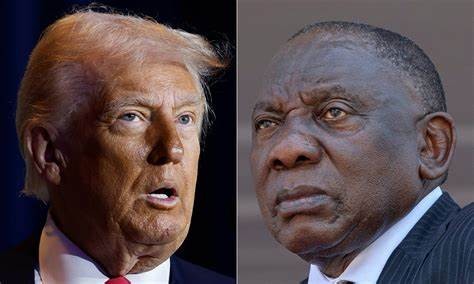President Cyril Ramaphosa’s office confirmed that he would be meeting with U.S. President Donald Trump this week following days of speculation by the media. The South African Rand is currently edging up against a weaker Dollar in early trade on Thursday yesterday. At 0622GMT, the Rand traded at 18.22 against the dollar, about 0.3 % firmer than Wednesday’s closest level. Ramaphosa’s office said that his meeting with Trump on May 21 will provide a platform to reset the strategic relationship between the two countries, which has been at odds since Trump’s return to the Oval Office at the beginning of this year.
Investor attention will mainly be on March gold and mining, production figures at 0930 GMT, where economists polled by Reuters expect a fifth consecutive contraction. “Like manufacturing (data), mining continues to grapple with unfavourable domestic supply conditions and an increasingly subdued global economy,” said Nedbank economists in a research note, adding that the sector will likely weigh down economic growth in the first quarter of 2025. South Africa’s benchmark 2030 government bond was little changed in early deals, with the yield up 0.5 basis points to 8.945%.
Ramaphosa will try to negotiate a new trade agreement with Trump. But first the president (Ramaphosa) will want to understand what Trump wants for business with the United States. At the moment South Africa needs more diversification in its economy in terms of the manufacturing sector away from mining particularly gold. The country definitely needs investment back in its industries. There could be a risk as the mining sector becomes scarce in resources such as minerals, jobs could be lost. The government should work with the private sector to create alternative sources of employment for its people.
Meanwhile Ramaphosa’s four-day state visit to Washington DC will take place amid the fiasco of white South African “refugees” in the US.
The four-day state visit comes at a sensitive time, following a series of foreign policy disagreements and a controversial U.S. decision to grant refugee status to 49 white South Africans — a move that Pretoria has strongly opposed. The individuals, identified as Afrikaners, left South Africa for America earlier this week and claimed they faced racial persecution and “white genocide” in South Africa. Ramaphosa and South African authorities have widely discredited and dismissed these claims. On Monday, Ramaphosa publicly rejected the legitimacy of the 49 Afrikaners’ refugee claims, asserting they do not meet the international criteria for refugee status. “Those who are spreading misinformation to divide South Africa are anti-transformation and wish to return the country to its apartheid past,” he said.
“Those people who have left are not being persecuted, hounded, or treated badly, and they are leaving because they don’t want to embrace the changes that are taking place in our country in accordance with our constitution.”
Ramaphosa is right to make the arguments he made in defence of the country against the misinformation spread by the US mass media, particularly the right-wing. The acceptance of 49 Afrikaner dissenters by the US who they called refugees was a diplomatic tool on the part of the Trump Administration to compel Ramaphosa, the Government of National Unity and Ramaphosa’s advisors to (again) prevent South Africa pursuing the case of genocide against Israel in Gaza as well as possibly abandoning any redress of the land issue as a whole. Trump is a master manipulator seeking to divide and rule wherever he go goes or sets his eyes on. He is seeking to undermine South African sovereignty by blowing the treatment of the white Afrikaners out of proportion.
Ramaphosa still needs to be cautious concerning what deal Trump will want to make concerning the lifting of tariffs in exchange for trade with the US. Trump is above all a con artist and a manipulator. Ramaphosa on the domestic front needs to re-examine the land expropriation Act and decide what would be the best motion for implementing it in the country.
Article written by:
Yacoob Cassim
Journalist at Radio Al Ansaar






